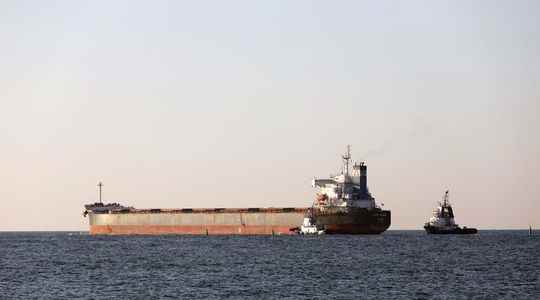For the second time, shootings took place on the site of the largest nuclear power plant in Europe, in Zaporizhia. And for the second time, fears of a nuclear incident have resurfaced in Ukraine, a country seriously affected by the Chernobyl disaster. On this 163rd day of war, a report by Amnesty International denouncing certain strategic choices of the Ukrainian army also continues to cause controversy. In addition, several cereal cargo ships must leave the Black Sea, thanks to the agreement on wheat signed on July 22nd.
- Five new grain cargo ships departing from Ukraine
Five cargo ships loaded with cereals are due to set sail this Sunday, departing from the Ukrainian ports of Chornomorsk and Odessa in order to continue the export of cereals, announced the Joint Coordination Center (CCC) which oversees these operations authorized by the signature on 22 last July of an agreement also involving Russia, Turkey and the United Nations.
In total, these boats will transport more than 161,000 tons of corn and food products to Turkey, China and Italy, according to the CCC which will follow their progress until Istanbul, where they will be inspected offshore before borrowing the Bosphorus. With these new starts, Ukrainian grain exports are gradually finding a steady pace. What relieve cereal importers, while food prices have exploded since the start of the war in Ukraine.
- IAEA increasingly concerned about Zaporizhia nuclear power plant
The International Atomic Energy Agency (IAEA) judged, Saturday, “more and more alarming” the situation on the nuclear site of Zaporijia, the largest power plant in Europe, the day after strikes nearby. In a statement, the organization believes that there is a “real risk of nuclear disaster, which could threaten health and the environment in Ukraine and beyond”.
On Saturday, Ukraine’s atomic energy company Energoatom said the day’s shelling had “seriously damaged” a station containing nitrogen and oxygen and an “auxiliary building”. “There are still risks of leaking hydrogen and radioactive substances, and the risk of fire is also high,” she said, as Russians and Ukrainians accuse each other of carrying out the shootings very high risk.
In March, when the plant was taken over, Russian troops opened fire on an annex building, rekindling fears of a new nuclear incident in the country, hit by the Chernobyl disaster. These new shots, which led to the shutdown of one of the plant’s six reactors, made Westerners react strongly. The European Union notably condemned “the irresponsible violation” of nuclear security rules by Russia, accused of deploying missiles from the nuclear site.
- Head of Amnesty Ukraine resigns
The head of Amnesty International in Ukraine, Oksana Pokaltchouk, announced overnight from Friday to Saturday her resignation following the NGO’s report accusing the Ukrainian armed forces of endangering civilians, which provoked the anger of kyiv. On the same day Amnesty affirmed that it fully assumes this document, which shows that the Ukrainian soldiers sometimes occupy civilian infrastructures, such as schools and hospitals.
- Russian occupation official dies after attack
An official of the Russian occupation administration in the southern Ukrainian region of Kherson died of his injuries after an attack, local authorities appointed by Moscow announced on Saturday. According to the state agency TASS, Vitali Goura, deputy head of the administration of Nova Kachovka, in charge of communal services, suffered multiple gunshot wounds.
In recent months, several officials appointed by the Russians in the Ukrainian territories they conquered have been the target of attacks. Since a large part of the Kherson region and part of that of Zaporijjia have been taken, the Kremlin has been pursuing a policy of Russification there with a view to possible annexation. Moscow introduced the ruble there and encourages their inhabitants to receive Russian passports.
